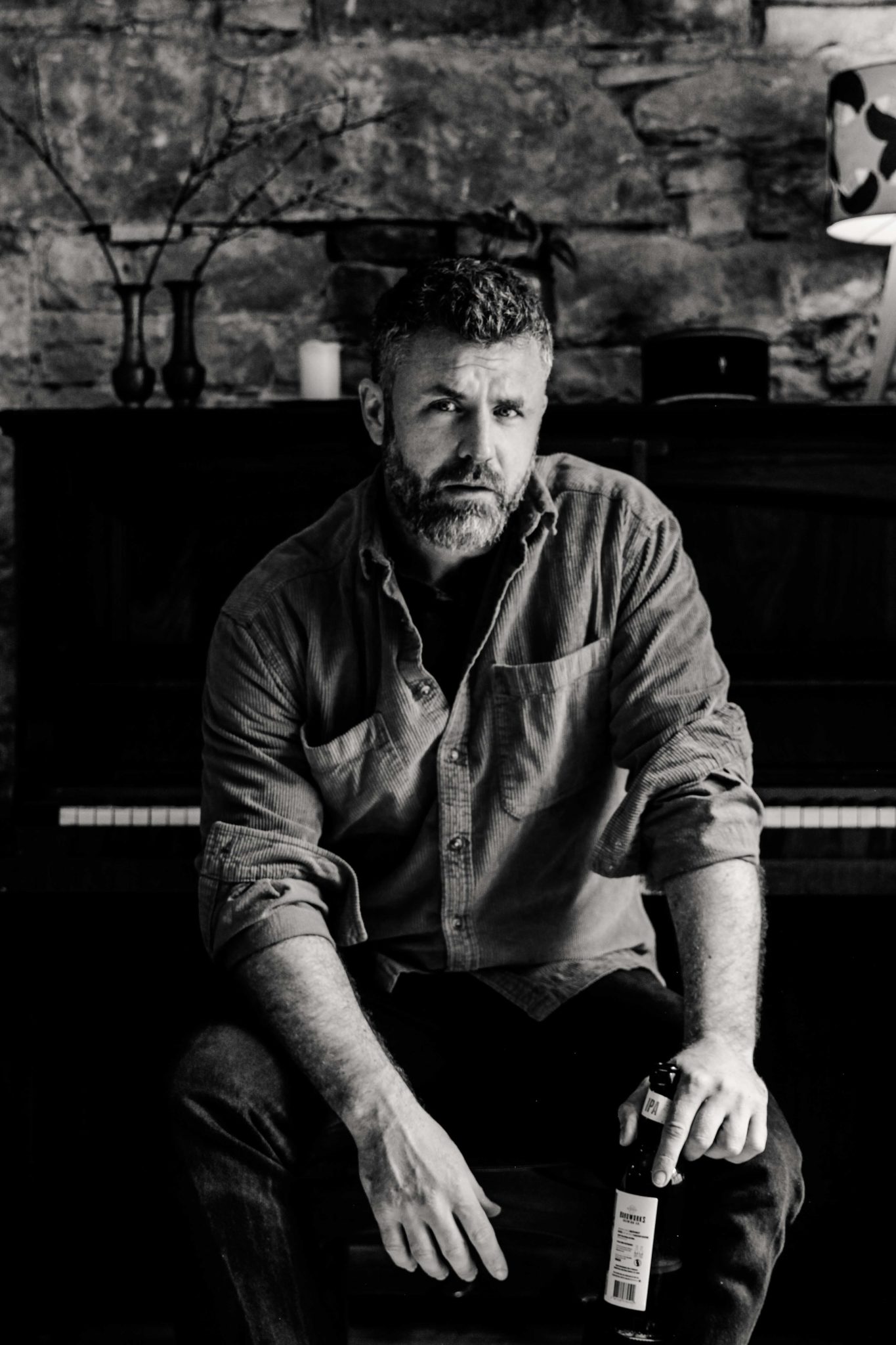- Music
- 18 Sep 23
Mick Flannery: "Are any of us in control, or are we all dash-cams on the head of a horse?"

As he returns with his eighth studio album, Goodtime Charlie, Mick Flannery discusses America, writing songs on the side of the road, and signing to John Prine’s Oh Boy Records.
Several years before John Prine’s death during the Covid-19 pandemic – and long before Mick Flannery signed to his label, Oh Boy Records – the Cork singer-songwriter and the iconic American artist met, briefly, backstage at Vicar Street.
“Bren Berry, the man who runs Vicar Street, took pity on me, and brought me up to the dressing room after John’s gig to say hello,” Mick recalls now. “He said some nice things about the songs of mine that he'd heard. I left because he was eating his fish and chips, and I didn’t want to be interrupting his post-show supper!”
In the run-up to the release of his powerful, life-affirming new album, Goodtime Charlie, Mick was announced as the first international signing for Oh Boy Records – the independent label co-founded by John Prine in Nashville in 1981. John’s Irish wife, Fiona Prine, now serves as the label’s president.
“I’ve met Fiona a good few times since,” Mick resumes. “I feel very sorry for her. It was a tough passing for her husband – very isolated because of Covid restrictions. It was a lonesome-sounding passing, which was very sad for such a lovely man, and someone who would otherwise have had people surrounding him.”
Mick’s life has similarly been touched by loss – with his father, mathematician Dr David Flannery, having passed away in August. Last year, Mick also shared the album Keepsake to his Bandcamp page, which was recorded by his late mother Elaine, who died of cervical cancer in 2014, following an alleged misdiagnosis. Remarking that “she, among many other Irish women, was terribly let down, and suffered unnecessarily,” Mick noted that all proceeds from the album would be donated to Marymount Hospice.

Credit: Susie Conroy
A multi-award-winning, double-platinum-selling artist, who was previously signed to a major label, Mick kicked off a run of independent releases in 2019, with his chart-topping, self-titled sixth album. That was followed by his 2021 collaboration LP with Susan O’Neill, In The Game – the biggest-selling independent record in Ireland that year.
But his new deal, he says, feels like “a good fit…”
“As opposed to some of my prior engagements in the record industry, which felt not so good a fit,” he adds. “There’s only so much I can do [independently] when it comes to distribution and promotion in other countries. The Oh Boy label have taken on the North American responsibilities, and that’s something that wouldn’t have otherwise happened. For the last two albums, we didn’t have partnerships over there, so there was no distributions to shops.
“Fiona Prine and her people – apart from being lovely – are very well connected, because of the history of the label, and how much everyone around them loved John.”
It’s fitting that the new album will be getting North American distribution – given that Mick’s music, and particularly this album, has been so strongly shaped by life-long American influences, and transatlantic musical partnerships.
“It’s the type of music that I grew up listening to, and have continued to listen to all my life,” he reflects. “Sometimes I get a little bit queasy about it, because I hear what could be considered a more authentic sound from other Irish bands – where they hold onto their accents. They’re writing songs about Irish places and themes, whereas I haven’t done that.
“I just try to write the songs that I like,” he adds. “I can’t easily veer away from what I grew up feeling as what a song was.”

Mick Flannery at Iveagh Gardens. July 2022. Copyright Miguel Ruiz.
For one track, ‘Minnesota’ – which was originally released in 2020 – Mick enlisted the vocals of lauded Vermont singer-songwriter Anaïs Mitchell, largely because he felt that what he had penned was “too American-based.”
“It was around the time of the death of George Floyd [in Minneapolis, Minnesota], and I felt a bit icky about making commentary from afar,” he says. “So I asked Anaïs if she felt like these words rang through to her, and would she be willing to sing it as an American woman – because that’s the point of view of the song.”
Tennessee artist Valerie June, meanwhile, appears on the moving ‘The Fact’, which was inspired by a fatal crash involving a young man that Mick witnessed while driving on his own from Louisiana to Georgia. In fact, by the time Mick had arrived at his destination, he had completed the song – and performed it the next day as part of a recorded session at the Paste Studio in Atlanta.
“I just wrote the song in my head on the drive,” he reveals. “I couldn’t figure out the rental car, so I couldn’t listen to music. I was sitting in silence the whole way, so it was a good time to just practise that. I pulled over to the side of the road at one point, got my guitar out of the boot, figured out the chords, and recorded a demo of it on my phone.”
In his younger years, Mick’s musical influences fed into a somewhat romanticised image of America – something he had to face up to as he spent time over there in his early 20s.
“I had watched Bob Dylan’s No Direction Home documentary, where he goes to New York and meets all his contemporaries, starts writing lots of songs, and becomes very influential himself,” he recalls. “So I had this romantic idea when I went to New York that this was going to happen, and I was going to join the scene there. But Bob Dylan was there in the ‘60s, and I was there in the early ‘00s – very different times. It’s very hard to be romantic about that country now, because of the political environment in America, and the growing divergence and polarisation of thought over there. It seems in such turmoil.
“Although,” he adds, “when I’ve travelled there, the turmoil almost feels thrust upon America. When you go to a gig there, or stay in people’s houses, you just meet lovely people all the time.”

Mick Flannery at Collins Barracks. Saturday 26 of August 2023. Copyright Piper Sewell.
Like the best of John Prine’s work, Mick’s songs are deeply empathetic, while also striking that balance between earnestness and natural cynicism.
“I’d be adverse to full-on earnest, breath-y, shoegaze-y, woe-is-me kind of stuff,” he says. “So I’m happy that there’s a few more light-hearted songs on this! John Prine was the king of writing tongue-and-cheek lyrics. Like his song ‘When I Get To Heaven’. I just fucking love that song. It’s so clever.”
One of the Goodtime Charlie’s emotional highlights is the final track, ‘Push The Cart’, which Mick describes to me now as “kind of an agnostic song.” Interestingly, it follows ‘What They Say’, a song laden with religious references.
“Now that you mention it, I actually did deliberately put those two songs together,” he notes. “I’ve always been curious about, ‘What the fuck is going on? What is this? How did the universe get here?’
“And free will is a constant subject that’s been on my mind a lot,” he adds. “Are any of us in control, or are we all dash-cams on the head of a horse?”
• Goodtime Charlie is out now. See a full list of Mick's upcoming dates here.
RELATED

- Music
- 15 Dec 25
Adebisi Shank release special Christmas mixtape

- Music
- 11 Dec 25
21 Savage announces new album
RELATED

- Music
- 09 Dec 25
Album Review: Seán O'Meara, Notions, Potions & Emotions

- Music
- 05 Dec 25
Album Review: Nick Cave & The Bad Seeds, Live God

- Music
- 03 Dec 25
60 years ago today: The Beatles released Rubber Soul

- Music
- 28 Nov 25
Album Review: Aran Sheehy, Overseer

- Music
- 27 Nov 25
Album Review: Michael Banahan, Broken Heart

- Music
- 27 Nov 25


